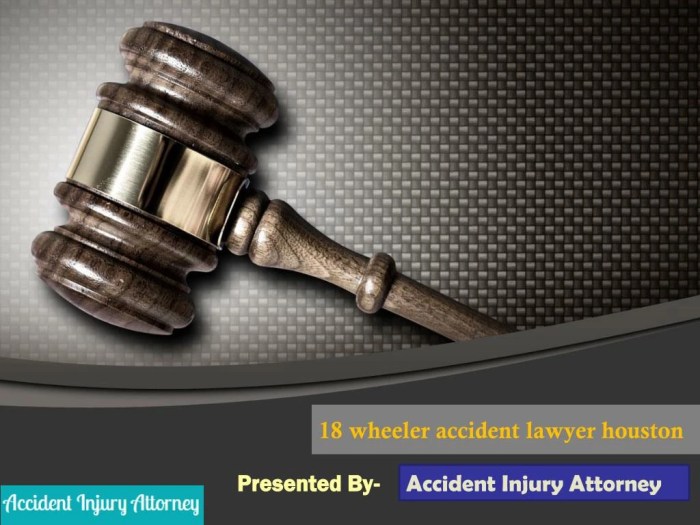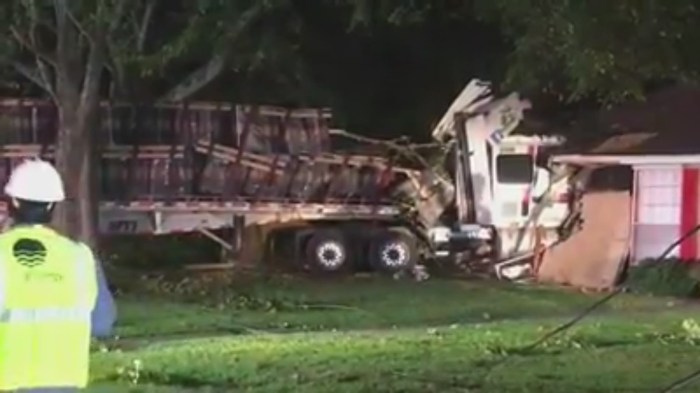Baton Rouge 18-Wheeler Accident Attorney
18-Wheeler Accidents in Baton Rouge
Baton rouge 18-wheeler accident attorney – Baton Rouge, like many other major cities, experiences a significant number of 18-wheeler accidents annually. These incidents often result in severe injuries and substantial financial losses for those involved. Understanding the causes, legal ramifications, and the role of an attorney is crucial for navigating these complex situations.
Common Causes of 18-Wheeler Accidents in Baton Rouge
Several factors contribute to the high incidence of 18-wheeler accidents in Baton Rouge. Driver fatigue, a common culprit, often stems from pressure to meet tight delivery schedules. Poor vehicle maintenance, including brake failure or tire blowouts, is another significant contributor. Inadequate driver training and a lack of adherence to safety regulations play a substantial role. Adverse weather conditions, such as heavy rain or fog, further complicate matters and increase the risk of accidents.
Finally, distracted driving, encompassing the use of mobile phones or inattention to the road, frequently contributes to collisions.
Types of Injuries Sustained in 18-Wheeler Accidents
The sheer size and weight of 18-wheelers often lead to catastrophic injuries. These can range from minor cuts and bruises to severe trauma, including spinal cord injuries, traumatic brain injuries (TBIs), and broken bones. Amputations are sadly not uncommon. Internal bleeding and organ damage are also potential outcomes. The severity of the injuries directly correlates with the force of impact and the specific area of the body affected.
Legal Complexities of 18-Wheeler Accident Cases
Navigating the legal landscape following an 18-wheeler accident is notoriously challenging. Multiple parties may share responsibility, including the truck driver, the trucking company, and even the manufacturer of the vehicle if a mechanical defect is implicated. Federal regulations governing trucking companies and their drivers add another layer of complexity. Establishing liability requires meticulous investigation and a thorough understanding of relevant laws and regulations.
Examples of Negligent Actions Leading to 18-Wheeler Accidents
Negligence plays a central role in most 18-wheeler accidents. Examples include speeding, driving under the influence of alcohol or drugs, failing to maintain a safe following distance, ignoring traffic signals, and improper lane changes. A failure to properly secure cargo can also lead to accidents, as can ignoring mechanical problems or failing to conduct proper pre-trip inspections.
Comparison of 18-Wheeler Accident Types and Causes
| Accident Type | Common Causes | Typical Injuries | Legal Challenges |
|---|---|---|---|
| Rear-end Collision | Following too closely, distracted driving, sudden braking | Whiplash, head injuries, back injuries | Determining fault, proving negligence |
| Sideswipe Collision | Improper lane changes, distracted driving, speeding | Lacerations, broken bones, internal injuries | Establishing liability, proving driver error |
| Rollover Accident | Speeding, improper loading, tire failure | Severe trauma, spinal cord injuries, fatalities | Investigating vehicle maintenance, cargo securement |
| Jackknife Accident | Brake failure, sudden braking, icy roads | Severe trauma, spinal cord injuries, fatalities | Determining cause of brake failure, proving negligence |
The Role of an 18-Wheeler Accident Attorney
Given the complexities involved, securing legal representation is paramount after an 18-wheeler accident. An experienced attorney specializing in these cases possesses the knowledge and resources to navigate the legal system effectively and secure the best possible outcome for their client.
Services Offered by an 18-Wheeler Accident Attorney
Attorneys specializing in 18-wheeler accidents provide a comprehensive range of services, including investigating the accident, gathering evidence, negotiating with insurance companies, filing lawsuits, and representing clients in court. They also advise clients on their legal rights and options, and help them understand the complexities of the legal process.
Process of Hiring an 18-Wheeler Accident Attorney
The process typically begins with a consultation, where the attorney assesses the case and discusses the client’s options. A contingency fee agreement is common, meaning the attorney only receives payment if a settlement or verdict is obtained. Thorough vetting of the attorney’s experience and reputation is crucial before engaging their services.
Investigation of an 18-Wheeler Accident
A thorough investigation is crucial. This involves collecting evidence such as police reports, witness statements, medical records, and vehicle data. Accident reconstruction experts may be consulted to determine the cause of the accident. The attorney will also investigate the trucking company’s safety records and compliance with regulations.
Negotiating Settlements and Representing Clients in Court
The attorney negotiates with insurance companies to secure a fair settlement. If a settlement cannot be reached, the attorney will prepare and file a lawsuit. They will represent the client in court, presenting evidence and arguing their case before a judge or jury.
Examples of Successful Cases
While specific case details are often confidential due to client privacy, successful cases frequently involve compelling evidence demonstrating clear negligence on the part of the trucking company or driver. This might include documented instances of driver fatigue, inadequate maintenance records, or violations of safety regulations. Strong medical evidence detailing the severity of the injuries is also crucial.
Legal Aspects of 18-Wheeler Accident Claims: Baton Rouge 18-wheeler Accident Attorney
Understanding the legal principles governing these cases is essential for a successful claim. This involves knowing the burden of proof, applicable laws, and the types of damages that can be recovered.
Key Legal Principles Applicable to 18-Wheeler Accident Cases
These cases are often governed by negligence principles. The plaintiff (injured party) must prove the defendant (truck driver or company) owed a duty of care, breached that duty, and that the breach directly caused the plaintiff’s injuries. Federal Motor Carrier Safety Regulations (FMCSRs) play a significant role, as violations can be used to establish negligence.
Burden of Proof in Proving Negligence
The plaintiff bears the burden of proving negligence by a preponderance of the evidence—meaning it’s more likely than not that the defendant’s negligence caused the accident. This often requires substantial evidence, including witness testimony, expert opinions, and physical evidence.
Types of Damages That Can Be Recovered
Damages can include medical expenses, lost wages, pain and suffering, property damage, and in some cases, punitive damages if the defendant acted with gross negligence or malice. The amount of damages awarded depends on the severity of the injuries and the specific circumstances of the case.
Process of Filing a Lawsuit Against Trucking Companies and Drivers
Filing a lawsuit involves drafting a complaint, serving it on the defendants, engaging in discovery (exchanging information), and potentially going to trial. The process can be lengthy and complex, requiring the expertise of an experienced attorney.
Comparison of Legal Strategies
Legal strategies vary depending on the specifics of the case. Some cases may focus on proving driver negligence, while others may target the trucking company for failing to properly maintain its vehicles or comply with safety regulations. Expert witnesses, such as accident reconstructionists and medical professionals, play a crucial role in shaping the legal strategy.
Gathering Evidence in 18-Wheeler Accident Cases
Prompt and thorough evidence gathering is crucial for building a strong case. This involves securing all relevant information immediately following the accident.
Importance of Gathering Evidence Immediately After an Accident
Evidence can be lost or compromised over time. Immediate action is crucial to preserve valuable information. This includes taking photographs of the accident scene, obtaining contact information from witnesses, and seeking immediate medical attention.
Essential Evidence to Collect
Essential evidence includes the police report, witness statements, photographs of the accident scene and damage to vehicles, medical records, employment records documenting lost wages, and any relevant vehicle maintenance records. Securing the black box data from the truck is also vital, if possible.
Methods Used to Reconstruct Accident Scenes

Source: slideserve.com
Accident reconstruction experts utilize various techniques, including analyzing skid marks, vehicle damage, and witness accounts, to determine the sequence of events leading to the accident. They often employ computer simulations and other advanced technologies to recreate the accident scene.
Role of Expert Witnesses

Source: wwltv.com
Expert witnesses, such as accident reconstructionists, medical professionals, and trucking industry experts, provide crucial testimony regarding the cause of the accident, the severity of injuries, and the defendant’s adherence to safety regulations.
Steps Involved in Securing and Preserving Evidence
Securing evidence involves taking detailed notes, photographing the scene, collecting witness statements, and preserving any physical evidence. This evidence must be properly stored and handled to maintain its admissibility in court. Chain of custody documentation is essential.
Illustrative Case Studies
Hypothetical case studies can illustrate the impact of strong versus weak evidence in 18-wheeler accident cases.
Successful 18-Wheeler Accident Claim, Baton rouge 18-wheeler accident attorney
A hypothetical case might involve a truck driver falling asleep at the wheel due to documented fatigue, leading to a rear-end collision. The injured party suffered severe spinal cord injury, requiring extensive medical treatment and resulting in permanent disability. The trucking company’s records revealed multiple violations of hours-of-service regulations, providing strong evidence of negligence. A successful lawsuit resulted in a significant settlement for the plaintiff.
Less Successful Outcome
Conversely, a less successful case might involve a minor fender bender with limited injuries and scant evidence. The police report might be inconclusive, and there are no witnesses. The plaintiff’s medical records show minor injuries that healed quickly. Without substantial evidence of negligence, the claim is unlikely to succeed.
Impact of Strong Evidence versus Weak Evidence
The difference lies in the strength of the evidence presented. Strong evidence, such as witness testimony, detailed police reports, compelling medical records, and documented violations of safety regulations, significantly increases the chances of a successful outcome. Weak evidence, conversely, makes it difficult to prove negligence and obtain a favorable settlement or verdict.
Hypothetical Accident Scene Description
Imagine a rain-slicked interstate highway at night. An 18-wheeler, travelling at an excessive speed, hydroplanes and loses control, jackknifing across multiple lanes. A smaller sedan, unable to avoid the collision, is struck broadside. The impact causes significant damage to both vehicles. The truck’s cargo, inadequately secured, spills onto the roadway, further obstructing traffic and hindering emergency response.
Poor visibility due to heavy rain and lack of adequate road lighting are contributing factors.
FAQ Corner
What types of damages can I recover in an 18-wheeler accident case?
Damages can include medical expenses, lost wages, pain and suffering, property damage, and in some cases, punitive damages.
How long do I have to file a lawsuit after an 18-wheeler accident?
The complexities of a Baton Rouge 18-wheeler accident demand specialized legal expertise, navigating issues far beyond those in a typical car accident. For similar high-stakes injury cases, consider the resources available to those seeking a car accident attorney Chester County might offer. Ultimately, the aggressive pursuit of justice in a Baton Rouge 18-wheeler case requires a lawyer equally adept at handling the unique challenges presented by large commercial vehicle accidents.
Louisiana has statutes of limitations for personal injury cases. It’s crucial to consult with an attorney as soon as possible to determine the applicable deadlines.
What if I am partially at fault for the accident?
Louisiana follows a comparative negligence system. Even if you share some responsibility, you may still be able to recover damages, although the amount may be reduced based on your degree of fault.
How much does it cost to hire an 18-wheeler accident attorney?
Most 18-wheeler accident attorneys work on a contingency fee basis, meaning they only get paid if they win your case. Consult with attorneys to discuss their fee arrangements.





















